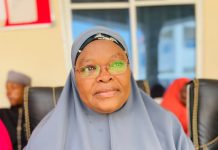A.B. NA’IBI COLLEGE OF NURSING SCIENCES, LAU: A BEACON OF HOPE IN HEALTH EDUCATION
In a part of Nigeria where getting good healthcare is still a big challenge, especially in the Northeast, something hopeful is happening in Lau, Taraba State. A.B. Na’ibi College of Nursing Sciences is a young but fast-growing school training nurses and midwives who are not only skilled but also caring. The college’s mission is to produce health workers who will serve both cities and rural areas with commitment and compassion.
In this exclusive interview with Mohammed Tikka, the Provost of the college, Hajiya Sharifatu Abdullahi Bakari, speaks on how the college started, the strong role of its founder Sheikh Dr. Abdullahi Bala Lau, the challenges faced, major successes, and what lies ahead for the institution.
Can you please introduce yourself?
Thank you very much. My name is Hajiya Sharifatu Abdullahi Bakari, and I am the Provost of A.B. Na’ibi College of Nursing Sciences in Lau. I have spent several years working in nursing education and administration. It is truly a great honour to lead this new college and work with a committed team to train nurses and midwives who will serve their communities with skill and honesty.
What inspired the creation of this college, and how involved was the founder Sheikh Dr. Abdullahi Bala Lau in the process?
The idea for the college came because there was a serious need for more trained health workers, especially in Taraba and the Northeast in general. The vision came from Sheikh Dr. Abdullahi Bala Lau. He is well known as a religious leader, but he also cares deeply about health, education, and the wellbeing of people. He played a big role from the very beginning—starting with the idea in February 2024, helping with planning, getting approvals, and supporting the process until the college became real. He is still a strong moral and spiritual guide for us.
Do you think this college is different from other nursing schools in Nigeria? If yes, what makes it unique?
Yes, I believe A.B. Na’ibi College is quite different. Like other colleges, we train nurses and midwives, but the way we do it makes us special. First, the college was built on strong values—discipline, religion, and academic excellence. Even though we are young, we already have good science laboratories, demonstration rooms, and we focus not just on cities but also on rural health through our community-based programmes. Also, we got quick accreditation from the Nursing and Midwifery Council of Nigeria and NBTE, which shows our readiness and commitment. Our aim is not just to produce professionals but good role models in healthcare.
This college is still young. Can you share some of the challenges and achievements so far?
Of course. As a new college, we faced some challenges such as building enough facilities for students, hiring enough qualified teachers, and gaining public trust. But we also achieved a lot in a short time. We got full accreditation from the Nursing and Midwifery Council on June 6, 2024, and approval from NBTE for the National Diploma on May 25, 2025. We admitted over 300 students within the first year, built well-equipped laboratories and demonstration rooms, and signed MoUs with top hospitals like FMC Jalingo, Specialist Hospital Jalingo, and others for clinical training. We also have a good team of facilitators who handle both theory and practical training.
How do students get admitted into the college?
Admission is based on merit. Students must have at least five credits in English, Mathematics, Biology, Chemistry, and Physics—not more than two sittings—in WAEC, NECO, NABTEB, or NBAIS. But NABTEB and NBAIS are not combined with other results. All applications are submitted through our online portal at https://application.abnacnm.edu.ng. After applying, students are invited for an aptitude test and interview to ensure only serious and qualified candidates are admitted.
What courses is the college offering currently? And how are you improving the school in both academic and non-academic areas?
We currently offer five main programmes: Basic Nursing, Basic Midwifery, Community Nursing, Community Midwifery, and the National Diploma (ND) in Nursing. Academically, we are improving our curriculum, bringing in digital tools for learning, and hiring more skilled facilitators. On the non-academic side, we focus on discipline, extracurricular activities, spiritual development, and improving campus safety. We are also expanding our facilities like hostels and staff offices to make the environment more comfortable for learning and working.
Is there any plan to introduce new programmes in the future?
Yes, there are. Now that we have NBTE’s approval to run the National Diploma, we are already working on introducing the Higher National Diploma (HND) in Nursing. We also plan to add other health-related programmes like Public Health Nursing, Health Information Management, and Environmental Health Technology, once we get the necessary approvals.
Is the college officially approved by the Nursing and Midwifery Council of Nigeria (NMCN)?
Yes, we are fully accredited by the NMCN. The approval was granted on June 6, 2024. This means our graduates are recognized and can be licensed to work as professional nurses and midwives anywhere in Nigeria.
Does the college have partnerships or affiliations with other schools or hospitals?
We don’t yet have a university affiliation, but we have signed agreements with many hospitals and health institutions for clinical training. These include Federal Medical Centre Jalingo, Specialist Hospital Jalingo, Primary Healthcare Development Agency, Health Services Management Board, and Jaji Clinic Jalingo. These partnerships give our students the hands-on experience they need.
Can you tell us about the general condition of the school in terms of facilities and staff? Are they strong enough to last?
Yes, we are doing well in that area. We have demonstration rooms, a modern science lab, well-furnished classrooms, and administrative offices. Our staff are qualified professionals who are committed to both theory and practical training. While we are always looking to improve, we are confident that what we have now meets the required standards and can support the college for many years.
What efforts are being made to ensure safety, discipline, and welfare for staff and students?
We take these matters very seriously. For security, we work with local law enforcement and have security personnel on campus. For welfare, we provide counseling services, religious support, and regular health checks for both students and staff. We also have strict rules to ensure good behavior and maintain a respectful and productive environment.
How is your relationship with the host community in Lau?
Our relationship with the Lau community is very peaceful and supportive. We’ve received great support from local leaders, government authorities, and the people. In return, the college has created jobs, encouraged development, and provided health education in the area. We see the community as our partner and always involve them in our activities.
Finally, what message do you have for parents, students, and the general public?
To parents, thank you for trusting us with your children. We promise to give them the best care and education possible. To our students, take your studies seriously, stay disciplined, and become great ambassadors of the college. And to the public, A.B. Na’ibi College of Nursing Sciences is here to serve and build a new generation of health workers. We invite everyone to support us, work with us, and help spread the word. Together, we can build a better future for healthcare in Nigeria. May Allah bless us all.








































